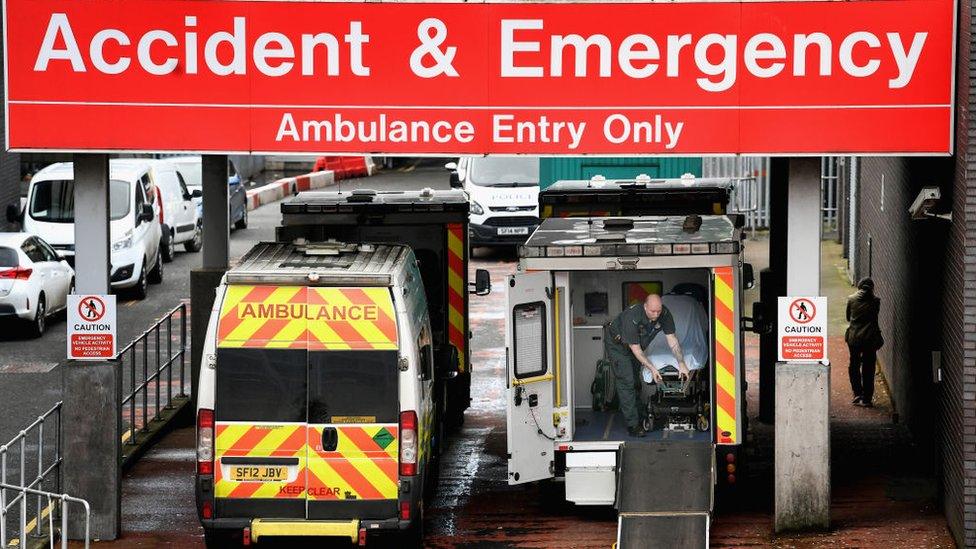Scotland's high-dependency health service
- Published
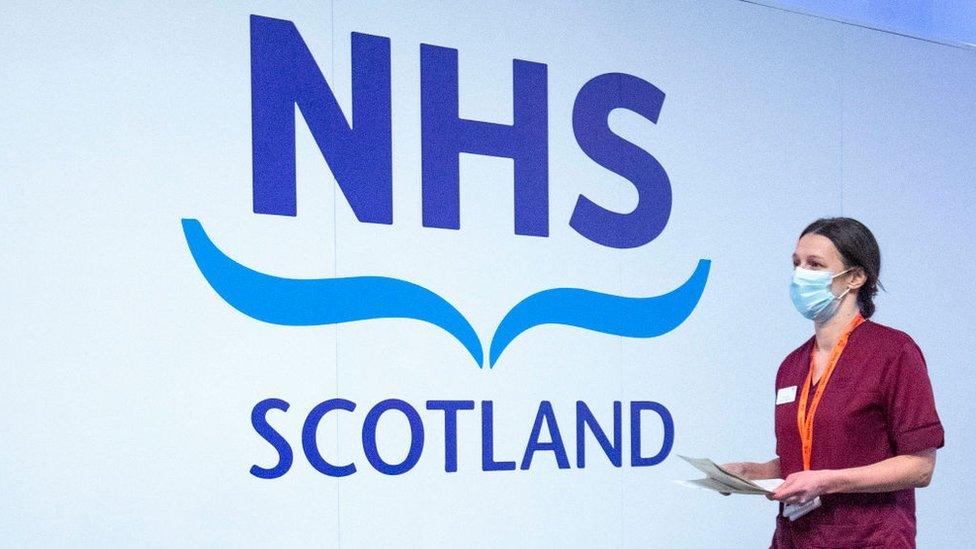
A new report from Scotland's public spending watchdog highlights the health service's problems getting bigger post-pandemic, with staffing shortages, health inequalities and financial pressures.
The backlog of treatments and uncertainty about the future course of Covid leave uncertainty, with the advice that health boards need to balance aspiration with reality, and prepare the public for a culture change in the way health is accessed.
Any number of billions of pounds can be thrown at the National Health Service, but if there aren't trained people out there to fill its vacancies, there's very little the money can do to heal its chronic problems.
We know they're chronic because Audit Scotland has been issuing regular warnings about the NHS, saying it is "financially unsustainable".
And the annual report this year - reflecting an extensive endoscopy of audit in the most detail we're likely to get - offers little reassurance that the problems can be solved.
On the contrary, the Covid pandemic has been a huge shock to the system, and set it back.
It's also set back health inequalities, and progress to longer life expectancy, which was slowing anyway.
The report details the enormous backlog of non-Covid cases, which have been well documented and reported in recent months. It also lays out the problem with the shortage of recruits.
And it adds that the net-zero commitments made for the NHS by the Scottish government are likely to add a very significant additional cost burden, if all its buildings are to be energy efficient within only 18 years.

The £38m Louisa Jordan hospital at the Scottish Event Campus was built early in the pandemic and is part of the Covid costs the NHS has been hit with
When the watchdog says the Scottish government's recovery plan is "ambitious", that ought to be translated from the cautious language of an auditor, to something more like "unlikely to be achieved" or perhaps even "unrealistic", and from paragraph 79, "not thought through".
It's worth remembering that Audit Scotland is not there to tell ministers if their priorities are right or wrong; its watchdog role is to check if ministers' priorities are being achieved, and money well spent.
It's also worth noting that the audit of the NHS experience through the pandemic acknowledges exceptional pressures, hard work and successes in meeting the challenges.
Call the midwife
There have been much harsher assessments of the way the NHS in England dealt with similar pressures - notably in the lack of financial controls over procurement.
Looking at some of the Audit Scotland themes in more detail, the workforce shortage continues to stand out as the toughest part of the NHS challenge.
Audit Scotland doesn't say as much, but without unravelling the staffing challenge, it's hard to see how other objectives can be met.
There are many vacancies for pre-existing posts, at a time when staffing is supposed to be on the rise.
In 2018, the government set out targets for 800 more GPs and 800 more in mental health.
The pandemic recovery programme adds 1,500 to staff up the new treatment centres intended to increase capacity and lower waiting lists for non-emergency procedures, plus 1,000 more in mental health, plus many more student medics.
In filling new and vacant posts, Brexit cut off the UK from recruiting in the European Union labour pool for all but the higher paid medical staff.

And it's getting tougher, as people leave. Speak to anyone in the NHS and they'll confirm that staff burnout is a serious problem.
While improved staff wellbeing is part of the recovery plan, this report points out that the demands of that same plan are so stretching that wellbeing may be further compromised.
And it is not just those in the scrubs and full body PPE that we get to see in high dependency units on TV news, but also the oft-maligned NHS managers.
It suggests more care should be taken over the officials who have been helping steer ministers and the service through the pandemic.
Leadership is also an issue, it says, with high turnover. And as vacancies arise, there aren't the experienced managers to step up. More succession planning is required.
Mind the gap
The challenge of health inequality is not due to the pandemic, but it has become clearer through the past two years.
The target of increased longevity is in the same place as 2012 to 2014. Between the best-off and the worst-off, the gap in healthy life expectancy, before chronic conditions set in, is now more than 20 years.
The problem is not just in socio-economic gaps, but on disability and ethnicity. There are programmes for women's and mental health, and new work is being done on racial minorities.
But other groups are left out, says Audit Scotland: "For instance, there are no separate plans for people with disabilities or those experiencing homelessness.
"The Scottish government should develop an overarching strategy for tackling health inequalities and develop work programmes for all target groups."
It may not have helped that a month after lockdown began, a new agency was created for the NHS at national level, called Public Health Scotland.
Audit Scotland notes that it has been largely taken up with the pandemic, while sorting out its leadership and organisation. Now, some other work is under way, such as on drug deaths and children's mental health.
The watchdog is looking for better data with which to measure progress, or otherwise, of the NHS and towards the Scottish government's targets.
'Not financially sustainable'
The data that is also worrying Audit Scotland is financial.
Newly-borrowed money came from the Treasury and was shovelled into the NHS boilers as they worked at full tilt through the pandemic.
The Scottish government notes that staffing levels have never been higher. Much of that money was going into Test and Protect and into vaccination.
Staffing costs in 2020-21 went up by £1bn to £8.6bn, and even though many procedures were put off, the drugs bill was up 13% to £2.7bn, continuing an underlying upward trend.
But the broader underlying problems of overspend by health boards spilled over into 14 out of 22 of them.
Again, that is not treated as a big surprise during a pandemic.
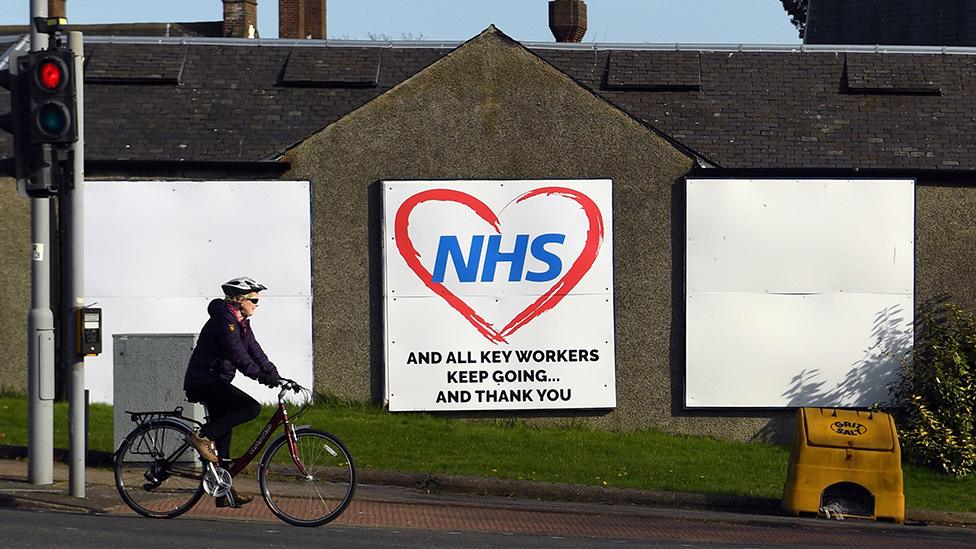
The Covid-19 pandemic created a huge load on Scotland's hospitals during both the first and second waves of the pandemic
But it concerns auditors, when they point to the lack of clarity in what will be needed to deal with future spikes of infection or new variants, or with Long Covid, or the stored-up problems from delayed treatments.
The message is put bluntly: "The NHS was not financially sustainable before the Covid-19 pandemic, with boards relying on additional financial support from government or non-recurring savings to break even. The scale of the financial challenge has been exacerbated by the pandemic."
Audit Scotland notes but makes no comment on the SNP's election promise to raise funding by £2.5bn. It then tells health boards they will have to balance "policy ambitions and available resources".
Insatiable demands
Clearly, post-pandemic change is coming to the NHS, and some of it may be uncomfortable.
Some may be controversial, such as re-directing pressure on accident and emergency services.
Some has been accelerated, such as the changes in access to GPs, increased use of virtual consultations, and closer co-ordination of hospitals with care homes.
But with high expectations of the NHS being there at the point of need, change is hard to sell.
There is a "need to continually engage with the public to shape priorities for recovery and develop sustainable, person-centred ways of delivering health and social care services," says Audit Scotland.
For now, though, most of the Scottish government response is to point to the pandemic response that it got right, continuing: "We agree with Audit Scotland that there is a clear opportunity to do things differently and build on the innovation and collaboration shown during the pandemic.
"That is why our work, including steps to improve data collection, and commitment to invest 20% more - £2.5bn - in our NHS will support recovery and reform."
It is possible that an extra injection of funds on that scale will make the finances of NHS Scotland sustainable, if the staff can be recruited, motivated and retained.
But remember there is another cost - to the other public services that are being squeezed by the apparently insatiable demands of the health service.
- Published24 February 2022
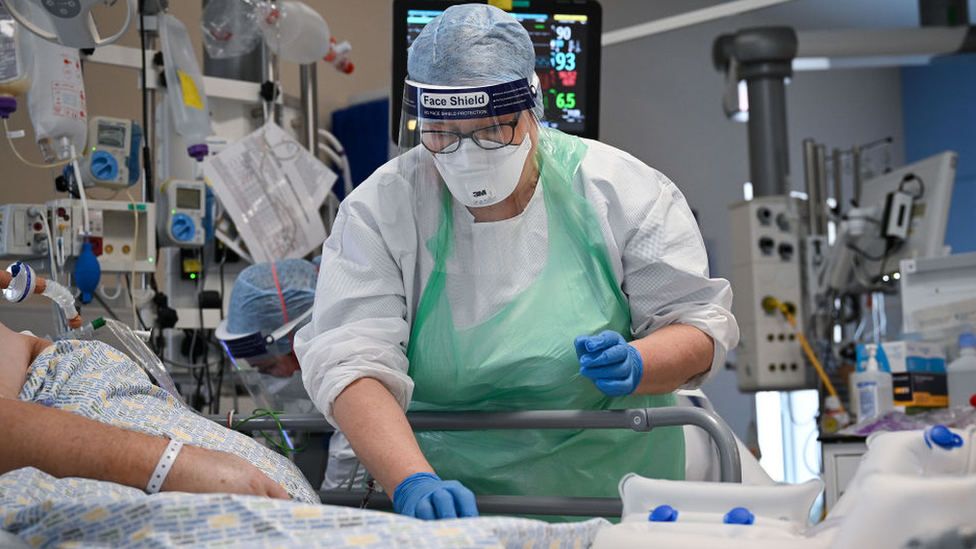
- Published22 February 2022

- Published8 February 2022

- Published7 February 2022
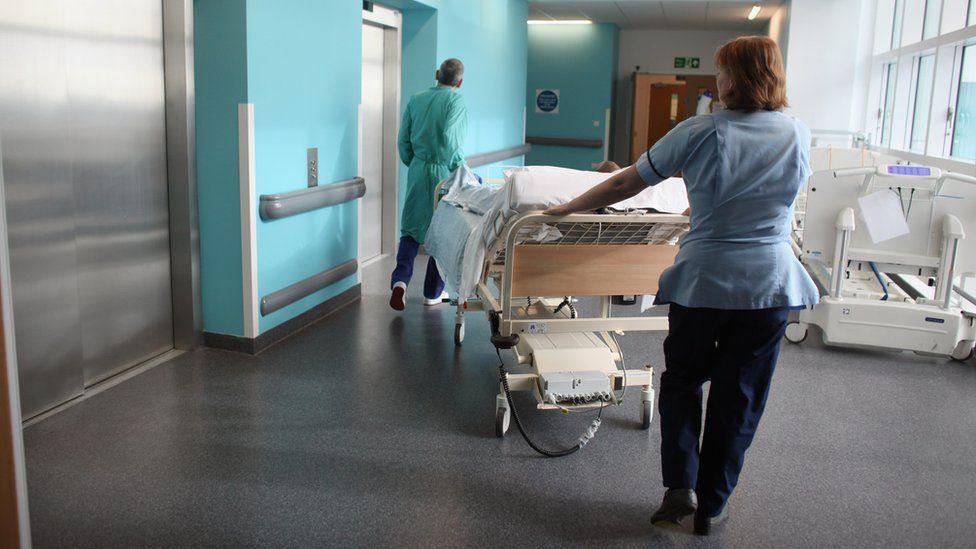
- Published18 January 2022
